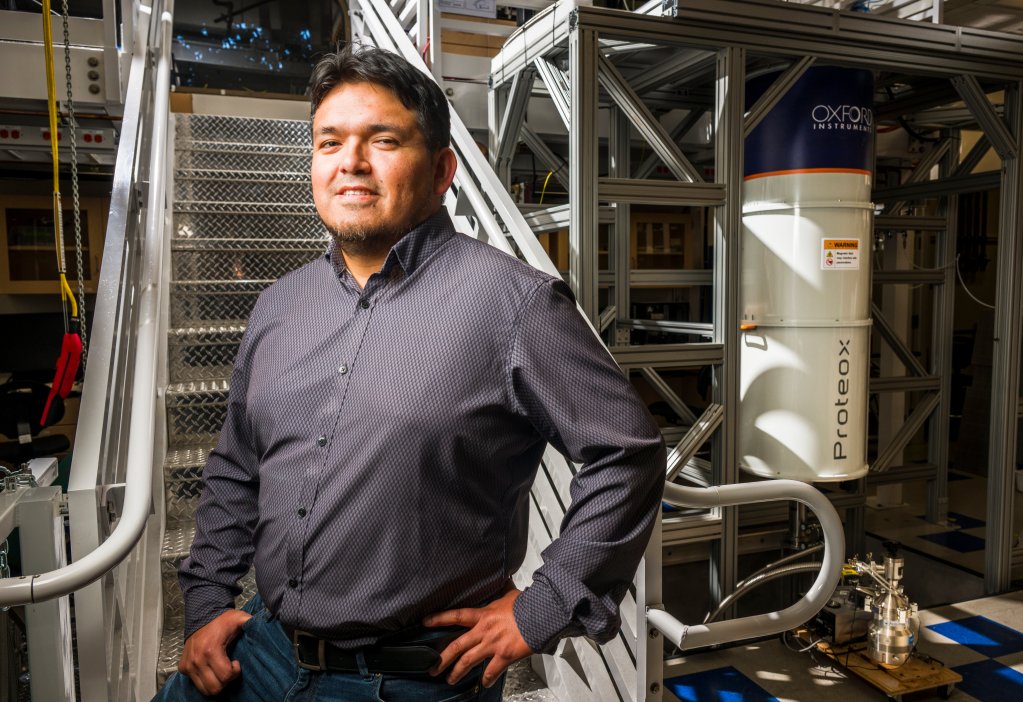Professor Luis Jauregui, a physicist at UC Irvine, has made significant strides in quantum research that could influence the future of computing and deep-space exploration. His team’s recent discovery involves a new state of quantum matter, which they believe may lead to computers impervious to radiation. This breakthrough presents exciting possibilities for technology used in deep-space travel.
Jauregui, who heads the Quantum Materials and Devices Lab at UC Irvine, emphasized the importance of making complex scientific ideas accessible. His research focuses on materials that could play a crucial role in the emerging field of quantum computing. “Reality already exists; we just don’t fully understand its rules at the quantum level,” Jauregui stated.
At the heart of Jauregui’s work is hafnium pentatelluride, a material developed in his lab by postdoctoral researcher Jinyu Liu. The team’s research on excitons—pairs of electrons that spin in tandem—has led them to propose a new understanding of quantum materials. These excitons represent a novel form of quantum matter, distinct from traditional states such as solids, liquids, and gases.
The discovery is particularly timely as the field of quantum science attracts both public and private funding, despite diminishing federal support for basic research. According to the Union of Concerned Scientists, federal scientific research grants fell by half in the first half of 2025 compared to previous years. This trend raises concerns about the sustainability of funding for vital research that may not have immediate commercial applications.
Jauregui and Liu’s experiments involved exposing electrons in hafnium to a magnetic field approximately 700 times stronger than typical household magnets. Conducted at the Los Alamos National Laboratory, these tests occurred under extreme conditions akin to those found in deep space, allowing the researchers to confirm the existence of excitons.
The implications of this research extend beyond theoretical physics. Jauregui suggests that the principles they are uncovering could act as foundational elements for future quantum bits, or qubits, which are essential for the next generation of quantum computers. Unlike traditional computers that process information in a linear fashion, quantum computers have the potential to perform multiple computations simultaneously, vastly increasing their efficiency.
Jauregui acknowledges the role of funding agencies in supporting innovative research directions. Currently, his lab receives support from organizations such as the National Science Foundation and the University of California’s Office of the President. He believes that the pursuit of basic scientific research is critical, not just for the advancement of technology, but for the broader understanding of the universe.
“Basic research isn’t a waste. It’s anything but that,” Jauregui remarked. His enthusiasm for discovery reflects a belief that significant breakthroughs often arise from unexpected findings and serendipitous moments.
Others in the scientific community echo Jauregui’s sentiments. Jocelyn Read, an astrophysicist at California State University, highlighted the importance of fundamental science in fostering curiosity and innovation. “Investing in basic research is saying that, ‘Yes, we too want to make lasting contributions to how we understand the universe,’” she stated.
As Jauregui and his team continue their work, they are poised to explore even deeper questions about the nature of matter. With each experiment, they aim to unravel the mysteries of quantum physics, potentially paving the way for advancements that could reshape technology and our understanding of the cosmos.
“Every time we look, with better tools and purer materials, nature surprises us,” Jauregui concluded, encapsulating the thrill of scientific exploration and the promise of discovery that lies ahead.
